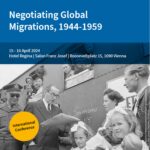 Vortrag bei der Tagung „Negotiating Global Migrations, 1944-1959“ (Web)
Vortrag bei der Tagung „Negotiating Global Migrations, 1944-1959“ (Web)
Time: 15.-16.04.2024
Venue: Vienna
Program (PDF)
The 1945 breakdown of the Nazi and the Japanese Empires led to the formation of a new global order. More than 60 million people were displaced and found themselves scattered across the war-torn landscapes of Europe and Asia. Mass displacement in many regions of both continents stipulated a global movement of (trans)migration by repatriation and resettlement that obliged the international community to find solutions that allowed to react to the humanitarian catastrophe on a wider, in fact, global level. As a part of these joint international efforts, the postwar decade saw the establishment of new terminologies, procedures, and protocols, aiming at regulating mobility on a global scale, yet still based on multiple different national demands.
A new global refugee regime emerged through multi-layered negotiation processes between the institutional and administrative level (UN organizations such as UNRRA and CNRRA, IRO, nation states, religious relief organizations, various NGOs), relief organizations, and countless individuals categorized as migrants, refugees, Displaced Persons and others. Recipient countries such as Australia, Latin America, the USA and Canada, to name some preferred resettlement destinations, became important agents within the migration regimes.
In the post-war years, and especially when the IRO dealt with the so-called „hard core“ of the remaining „Displaced Persons“ still stranded in camps across Europe and Asia, a modern refugee regime took shape. While the modern concept of a refugee and initial steps towards international refugee policies had been developed during the interwar period as a consequence to forced displacements in Central, Southern and Eastern Europe, as well as in the Near East, the period after the Second World War presented new challenges and brought a more comprehensive approach towards the emerging, modern global migration regime. Read more and source … (Web)
Organizers: Kerstin von Lingen (Dep. of Contemp. History, Univ. of Vienna); Christoph Rass and Frank Wolff (Inst. für Migrationsforschung und Interkulturelle Studien, Univ. of Osnabrück)
